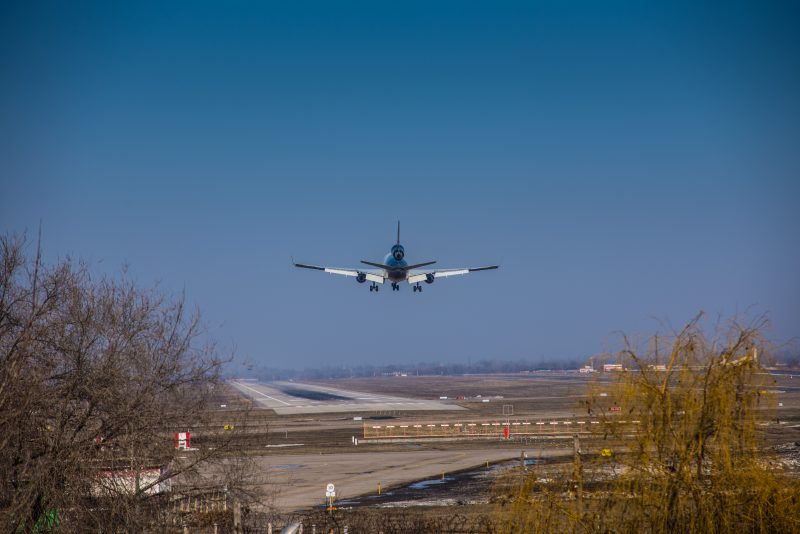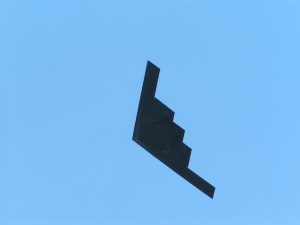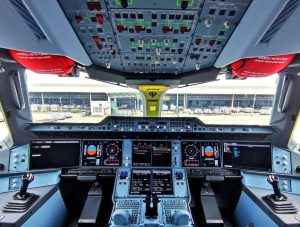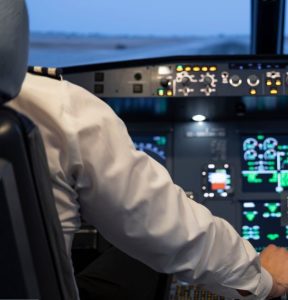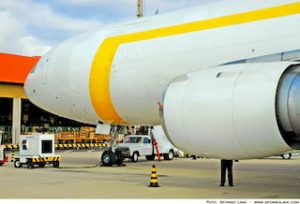Who Should Take A Multi-Crew Cooperation (MCC) Course?
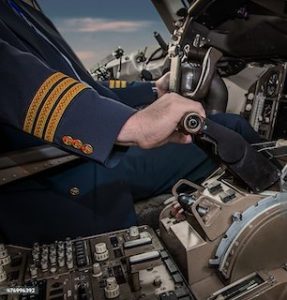 In the world of aviation, the ability to work effectively as part of a team is paramount. The Multi-Crew Cooperation (MCC) course is designed to teach pilots the essential skills required for efficient and safe operations within a multi-crew environment. This training is a crucial step for those transitioning from single-pilot operations to multi-crew commercial flying. But who exactly should consider taking an MCC course? This article delves into the various types of pilots who would benefit from MCC training and why it is a critical component of their professional development.
In the world of aviation, the ability to work effectively as part of a team is paramount. The Multi-Crew Cooperation (MCC) course is designed to teach pilots the essential skills required for efficient and safe operations within a multi-crew environment. This training is a crucial step for those transitioning from single-pilot operations to multi-crew commercial flying. But who exactly should consider taking an MCC course? This article delves into the various types of pilots who would benefit from MCC training and why it is a critical component of their professional development.
Role of MCC in modern aviation
The MCC course focuses on Crew Resource Management (CRM) principles, which encompass communication, leadership, decision-making, and teamwork. These skills are essential for managing the complexities of modern commercial aircraft operations, where multiple pilots must work together seamlessly to ensure safety and efficiency. The course prepares pilots to handle the dynamics of a multi-crew cockpit, making it an indispensable part of a professional pilot’s training.
1) Aspiring commercial airline pilots
Transition from single-pilot to multi-crew operations
Most pilots begin their careers flying single-pilot aircraft, where they are solely responsible for all aspects of flight operations. Transitioning to a multi-crew environment, such as those found in commercial airlines, requires a different set of skills. The MCC course is specifically designed to bridge this gap, providing the training needed to work effectively with other crew members.
Requirement for airline jobs
Many airlines require pilots to have completed an MCC course before they are considered for employment. This requirement is due to the course’s emphasis on teamwork, communication, and decision-making, all of which are crucial for safe and efficient airline operations. Aspiring commercial pilots who have completed the MCC course have a significant advantage when applying for jobs, as they are seen as better prepared for the demands of airline operations.
2) Pilots pursuing a type rating on multi-crew aircraft
Foundation for type rating training
A type rating allows a pilot to operate a specific type of aircraft and is required for many commercial aviation jobs. For multi-crew aircraft, completing an MCC course is often a prerequisite for type rating training. The skills learned in the MCC course, such as CRM and SOPs, provide a solid foundation for the more specific training required for a type rating.
Improved performance in type rating courses
Pilots who have completed an MCC course are generally better prepared for the rigorous demands of type rating training. The MCC course helps pilots develop the ability to work effectively with a co-pilot, follow standardized procedures, and make sound decisions under pressure. These skills are essential for successfully completing a type rating course and performing well in the cockpit of a multi-crew aircraft.
3) Military pilots transitioning to civil aviation
Differences between military and civil operations
Military pilots often operate in environments that differ significantly from those in civil aviation. While military flying emphasises precision and adherence to strict protocols, civil aviation requires a different approach, particularly in terms of CRM and working with civilian air traffic control.
Adapting to civilian multi-crew environments
For military pilots transitioning to civilian careers, the MCC course provides essential training in CRM and the dynamics of civil multi-crew operations. This training helps military pilots adapt to the differences in communication styles, decision-making processes, and teamwork found in civilian cockpits.
4) Corporate and business aviation pilots
Growing trend towards multi-crew operations
Corporate and business aviation are increasingly adopting multi-crew operations, especially for larger and more complex aircraft. Pilots in these sectors must be proficient in CRM and able to work effectively with other crew members.
Enhancing safety and efficiency
The MCC course equips corporate and business aviation pilots with the skills needed to enhance safety and efficiency in multi-crew operations. This training is particularly important for pilots who are transitioning from single-pilot operations or smaller aircraft to larger, multi-crew jets.
5) Pilots seeking career advancement
Building a competitive edge
In the competitive field of aviation, additional qualifications can make a significant difference in a pilot’s career progression. The MCC course is a valuable addition to any pilot’s resume, demonstrating their commitment to professional development and their ability to operate in a multi-crew environment.
Preparation for higher positions
Pilots who aspire to higher positions within an airline or other aviation organization, such as captain or chief pilot roles, will benefit from the MCC course. The training provides a solid foundation in leadership, communication, and decision-making, all of which are essential for higher-level positions.
Benefits of MCC training
Enhanced safety: One of the primary benefits of the MCC course is the enhancement of safety in flight operations. By training pilots to work effectively as a team, the course reduces the likelihood of errors and improves the ability to handle emergencies. Effective CRM is crucial for identifying and mitigating risks, ensuring that all crew members are on the same page and can respond appropriately to any situation.
Improved communication: Communication is a key component of CRM and a major focus of the MCC course. Pilots learn how to communicate clearly and effectively with each other and with air traffic control. This training helps to prevent misunderstandings and ensures that all necessary information is conveyed accurately and promptly.
Better decision-making: The MCC course trains pilots in effective decision-making processes, emphasising the importance of considering all available information and collaborating with other crew members. This approach leads to better-informed decisions and enhances the overall safety and efficiency of flight operations.
Increased efficiency: By fostering effective teamwork and communication, the MCC course helps to increase the efficiency of flight operations. Pilots who have completed the course are better able to manage their workload, coordinate with other crew members, and follow standardized procedures. This efficiency leads to smoother operations and can help to reduce delays and other operational issues.
Structure of an MCC course
Theoretical training:
The theoretical component of the MCC course covers a range of topics essential for multi-crew operations. These include:
-
- Crew Resource Management (CRM): Principles of teamwork, communication, leadership, and decision-making.
- Standard Operating Procedures (SOPs): Familiarisation with the procedures used by airlines and other aviation organisations.
- Human factors: Understanding the impact of human performance and limitations on flight operations.
- Risk management: Identifying and mitigating risks in multi-crew environments.
- Flight planning and management: Techniques for effective flight planning and management in a multi-crew context.
Practical training
The practical component of the MCC course involves hands-on training in a flight simulator, where pilots can apply the principles learned in the theoretical component. This training includes:
-
- Simulated flight scenarios: Practice in realistic flight scenarios, including normal operations, abnormal situations, and emergencies.
- Role-playing: Pilots take turns acting as captain and first officer, developing their ability to work in both roles.
- Debriefing and feedback: After each simulator session, pilots receive feedback on their performance and participate in debriefing sessions to discuss what went well and what could be improved.
Choosing the right MCC course
Accreditation and reputation
When selecting an MCC course, it is important to choose a training provider that is accredited and has a good reputation. Accreditation ensures that the course meets industry standards and that the training provider follows best practices. A good reputation indicates that previous students have been satisfied with the training and that the provider has a track record of producing competent pilots.
Experienced instructors
The quality of the instructors is a crucial factor in the effectiveness of an MCC course. Instructors should have extensive experience in multi-crew operations and a deep understanding of CRM principles. They should be able to provide valuable insights and practical advice based on their own experiences in the cockpit.
State-of-the-art facilities
The facilities and equipment used in the MCC course should be modern and well-maintained. This includes flight simulators that accurately replicate the aircraft and scenarios pilots will encounter in real-world operations. High-quality facilities ensure that the training is as realistic and effective as possible.
Comprehensive curriculum
The curriculum of the MCC course should be comprehensive and cover all the essential topics needed for multi-crew operations. It should include both theoretical and practical components, with ample opportunities for hands-on practice in the simulator.
Advance your career with MCC
The Multi-Crew Cooperation (MCC) course is an essential step for many pilots as they transition to multi-crew operations and seek to advance their careers in aviation. Whether you are an aspiring commercial airline pilot, a military pilot transitioning to civil aviation, a corporate or business aviation pilot, or someone looking to enhance your qualifications and career prospects, the MCC course provides invaluable training in teamwork, communication, decision-making, and operational efficiency. By choosing the right training provider and committing to this important training, pilots can significantly enhance their safety, competence, and employability in the highly competitive field of aviation.

